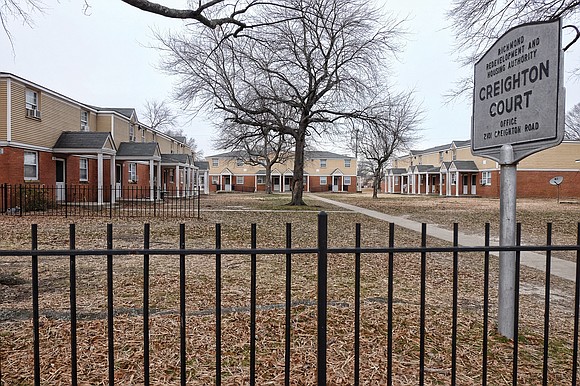Moving on up
Creighton Court developer’s $300M plan may cost $410,400 per unit
Jeremy M. Lazarus | 5/4/2023, 6 p.m.
The most expensive housing development in Richmond is headed to a neighborhood in the East End that has ranked high in poverty.
That neighborhood is Creighton Court, which fronts Nine Mile Road near the border with Henrico County.
The Community Builders (TCB) plans to spend $300 million to create 731 new apartments and homes over the next five years to replace the mostly razed 504-unit public housing complex that dates to 1953, according to a detailed financial report TCB provided to City Council.
That means the Boston-based nonprofit projects spending, on average, a record $410,400 per unit as it moves to create what is described as a vibrant mixed-income community where Creighton residents and others, including community newcomers, can live in subsidized and market-rate apartments and single-family townhomes
That average cost of each unit does not include the nearly $37 million TCB projects will be spent to install new underground piping, streets and other infrastructure.
That separate infrastructure cost will add nearly $50,615 to the average cost for each of the 731 units, rocketing the total average cost to a stratospheric $461,000 per unit.
No other housing development, whether being done by another nonprofit or by a private housing developer, comes close to that kind of cost, a review of recent reports on developments planned or underway shows.
TCB’s estimates of cost for the multi-phase redevelopment were attached to an ordinance that the council approved last month.
The vote cleared the way for City Hall to contribute $21 million to pay for new infrastructure in the first phases of the development. Infrastructure work is expected to start later this month on the first phase of 68 units.
No one on City Council questioned the amount of money being poured into this redevelopment in rubber-stamping the infrastructure funding. The redo of Creighton was first envisioned more than 10 years ago during the tenure of Mayor Dwight C. Jones.
The Creighton redevelopment began in 2016 with TCB’s construction of new apartments and homes on land where a former Armstrong High School building once stood on 28th Street, almost across the street from Creighton.
That TCB development also set records at the time for the cost of development, which Creighton’s redo will eclipse.
“Our proposal includes townhome-style buildings that are more costly to build than elevator buildings,” TCB spokeswoman Allison Marino-McDonough stated in response to a Free Press query about the high cost.
The oversized cost for Creighton is best explained, she continued, by the “historic increases in the cost of labor and materials” that the construction industry as a whole is experiencing.
“Despite these challenges,” she stated, “we are committed to continuing our 59-year track record of building and sustaining quality affordable housing,” she stated.
The Free Press consulted three developers, who spoke on condition of anonymity about TCB’s financials.
All are facing the same cost increases, and none could fathom why the redo of Creighton Court is so expensive.
“The numbers are too high – the question is why,” one developer stated, expressing the common view.
Another developer said that TCB has no incentive to prune costs. “I’d be out of business if I had to spend that kind of money,” he said.
He projects spending less than $210,000 per unit for his next project, including infrastructure expenses and land costs and other expenses that TCB does not have to pick up.
The high cost of the Creighton redo could slow the plans of City Hall and Richmond Redevelopment and Housing Authority’s plans to replace the five other big public housing complexes in Richmond with new mixed-income communities.
Already a private developer has secured approval to redo a portion of the Mosby Court complex, Mosby South, but there is no indication that the spending will reach TCB levels when that work is undertaken.
RRHA Spokeswoman Angela Fountain stated that TCB’s projected costs run from $332,000 to $483,000 per unit over the five-year life of the unit. She noted the highest per unit cost is expected to occur five years from now. She said that higher cost is based on a projected construction inflation rate of 8.5 percent a year, which is “far lower than the recent history where costs escalated nationally between 30 and 50 percent in the last two years.”
However, it is easy to find additional evidence that TCB is spending more than anyone in the Richmond housing field has ever contemplated.
Richmond-based Better Housing Coalition reported to supporters that it is building the 67-unit Cameo Street Apartments in Jackson Ward at a total development cost of $15.3 million, or $229,000 a unit. BHC also is building 160-unit addition to its Winchester Green community in Chesterfield County for $45 million or $281,250 a unit.
Maryland-based Enterprise Community Development, another nonprofit, is investing $21 million to build 66 apartment units in Highland Park. Cost per unit: $318,000.
Meanwhile, according to published reports, Historic Housing, a private Richmond-based developer, is creating a 12-story complex of market-rate apartments in Shockoe Bottom at a construction cost of around $200,000 a unit.
TCB, which plans to redo Creighton in 12 phases, estimated that the construction cost for the first 68 units will run nearly $260,000 a unit, not including design and engineering expenses or other pre-construction costs, or well above the cost for the privately developed complex.
Free Press requests for TCB’s development agreement and other explanatory documents from the Richmond Redevelopment and Housing Authority have gone unanswered.







